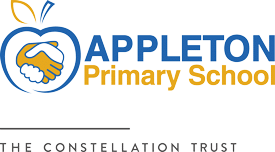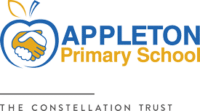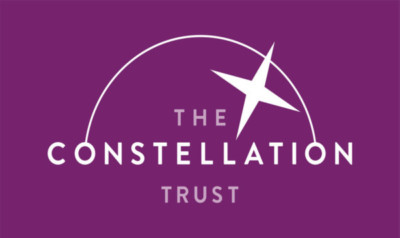English – Reading – curriculum overview
Intent
Reading has an important place in education and in society. A high-quality education in reading will direct pupils to speak and write fluently so that they can communicate their ideas and emotions to others; being a fluent reader also allows others to communicate with them. Through reading, pupils have a chance to develop culturally, emotionally, intellectually, socially and spiritually. Literature plays a key role in such development. By teaching reading, we intend to impart pupils with the knowledge, understanding, confidence, attitudes, values and skills they need in order to reach their potential as individuals and to become literate members of society.
At Appleton Primary School, we aim to ensure that all pupils:
- Read easily, fluently and with good understanding
- Develop the habit of reading widely and often, for both pleasure and information
- Acquire a wide vocabulary, an understanding of grammar and knowledge of linguistic conventions for reading, writing and spoken language
- Appreciate our rich and varied literary heritage
- Use discussion in order to learn; they are able to elaborate and clearly explain their understanding and ideas
By the end of EYFS, pupils will:
Say a sound for each letter in the alphabet and at least 10 digraphs. Read words consistent with their phonic knowledge by sound-blending, and read aloud simple sentences and books that are consistent with their phonic knowledge, including some common exception words.
Pupils will demonstrate understanding of what has been read to them by retelling stories and narratives using their own words and recently introduced vocabulary. Anticipate – where appropriate – key events in stories, and use and understand recently introduced vocabulary during discussions about stories, non-fiction, rhymes and poems and during role-play.
By the end of Key Stage 1, pupils will:
Be able to read books written at an age-appropriate interest level. They will be able to read them accurately and at a speed that is sufficient for them to focus on understanding what they read rather than on decoding individual words. They will be able to decode most new words outside their spoken vocabulary, making a good approximation to the word’s pronunciation. Pupils will continue to use relevant strategies to build their vocabulary and develop pleasure in reading and motivation to read.
Pupils will understand both the books that they can already read accurately and fluently, and those that they listen to. They are able to participate in discussions about books, poems and other works, taking turns and listening to what others say.
By the end of Key Stage 2, pupils will:
Be sufficiently fluent and effortless for them to manage the general demands of the curriculum in year 7, across all subjects and not just in English, but there will continue to be a need for pupils to learn subject-specific vocabulary. Pupils will understand nuances in vocabulary choice and age-appropriate, academic vocabulary.
Pupils will maintain positive attitudes to reading, reading widely and often, for both pleasure and information. Pupils will have a good understanding of what they read and discuss and evaluate how authors use language, including figurative language, considering the impact on the reader, and comparing characters, settings, themes and other aspects of what they read. They will be able to distinguish between statements of fact and opinion and apply the skills of information retrieval across different areas of the curriculum. Pupils will participate in discussions about books that are read to them and those they can read for themselves, building on their own and others’ ideas and challenging views courteously. Pupils will explain and discuss their understanding of what they have read, providing reasoned justifications for their views.
Implementation
Work is planned with reference to the National Curriculum, Constellation Trust progressive knowledge/skills document and the Read Write Inc (RWI) Synthetic Phonics Programme (see Read, Write Inc Policy). The focus is on developing a range of progressive skills in word reading and comprehension (both listening and reading).
Early Years Foundation Stage
F1
Reading is taught in nursery through the use of big and interactive books to introduce the skills of left to right orientation, turning the pages, discussing the pictures etc. Favourite books are repeated often and available for children to access in the well-resourced reading area inside and out. Topics are planned to cover a range of fiction and non-fiction books, and to follow the children’s interests. Our RWI Programme begins in our Nursery where adults and children share a wide variety of books, allowing children time to explore and use new vocabulary and widen their understanding of story book language. Children are then introduced to the pictures that accompany each sound in the set one sounds. In the third term the children begin to learn the letter sound correspondences. Concept vocabulary is specifically taught in a practical and effective way to ensure all children in nursery become secure with this fundamental vocabulary and can use it independently.
F2
Our phonics teaching is part of a broad and rich curriculum that engages children in a range of activities and experiences to develop their speaking and listening skills and phonological awareness. It is systematic and follows the carefully planned RWI programme, reinforcing and building on previous learning to secure children’s progress. Children who are at risk of falling behind the programme’s pace and expectations are identified early and additional 1:1 tuition is put in place to ensure that these children keep up and don’t have to catch up.
Storytime and poetry/singing time takes place daily in all classes to model reading skills and strategies and develop children’s vocabulary. The features of different text types are introduced in these sessions, whilst the use of big books and interactive whiteboards leads to purposeful class discussions about the text being taught. It also broadens and extends the children’s vocabulary and new/interesting words are added to a class “Interesting Words of the Week” booklet as appropriate. Through listening to repeated readings, and talking about what they have heard, the children have multiple exposures to vocabulary and the language of stories. Continued talk about words, as well as opportunities to use them, supports children to absorb the language. Teachers ensure that the meanings of words are explained (not just in the context of the story but also as children might use or hear them in their own lives) before planned opportunities for thought-provoking, playful, and interactive follow-up activities.
Vocabulary development is a key focus throughout EYFS, especially for disadvantaged pupils. Research shows that vocabulary is a huge predictor of how far children from any background will succeed at school and beyond. The words they know will help them to read, understand, gain new perspectives, and change or confirm their world view. We create a language-rich environment, where adults talk with children throughout the day, engaging them in high-quality dialogue as well as direct teaching, to support children to articulate what they know and understand, and develop their knowledge across all areas of learning, using the vocabulary they need to support learning. Staff ensure that during back and forth interactions with children they focus on:
- thinking out loud, modelling new language for children
- paying close attention to what the children say
- rephrasing and extending what the children say
- validating the children’s attempts at using new vocabulary and grammar by rephrasing what children say if necessary
- asking closed and open questions
- answering the children’s questions
- explaining why things happen
- deliberately connecting current and past events (‘Do you remember when…?’)
- providing models of accurate grammar
- extending children’s vocabulary and explaining new words
- connecting one idea or action to another
- helping children to articulate ideas in well-formed sentences.
In order to develop and extend children’s language, staff ensure careful, deliberate planning in each area of learning, with opportunities built in for plenty of repetition. They ensure the following questions are considered during their planning process:
- What do we want children to know and think about?
- What vocabulary is associated with this knowledge and thinking?
- How can we engage the children in back and forth talk that supports their knowledge and thinking?
- What photos could we take that would reinforce the vocabulary and language after an activity or visit?
- Which books could be read aloud and shared before and afterwards?
- Which songs might introduce or reinforce the vocabulary?
Key stage 1
Throughout key stage 1, the focus is on continuing the development of phonics skills through the RWI programme, along with fostering a love of reading.
Children in year 1 take part in daily phonics lessons to continue to help improve word reading skills and strategies to engage with texts. Phonics books are closely matched to children’s increasing knowledge of phonics and repeated readings of the texts support their increasingly fluent decoding. As the children become ready, the focus shifts to children applying their reading skills, using these for comprehension purposes and developing higher order skills of comprehension.
Pupils also have extensive experience of listening to, sharing and discussing a wide range of high-quality books with the teacher, other adults and each other to encourage a love of reading and broaden their vocabulary at the same time as they are reading independently.
Pupils entering year 1 who have not yet met the early learning goals for literacy continue to follow the school’s curriculum for the Early Years Foundation Stage to develop their word reading, spelling and language skills. However, these pupils follow the year 1 programme of study in terms of the books they listen to and discuss, so that they develop their vocabulary and understanding of grammar, as well as their knowledge more generally across the curriculum. If they are still struggling to decode and spell, they are taught to do this urgently through targeted support using RWI Fast Track Tutoring, so that they catch up rapidly.
During year 2, teachers continue to focus on establishing pupils’ accurate and speedy word reading skills and ensure that pupils are monitoring what they read, checking that the word they have decoded fits in with what else they have read and makes sense in the context of what they already know about the topic. They ensure that pupils listen to, and discuss, a wide range of stories, poems, plays and information books, including whole books, and teach pupils about cause and effect in both narrative and non-fiction. Teachers use strategies such as ‘thinking aloud’ when reading to pupils, which helps pupils to understand what skilled readers do.
Pupils who do not have the phonic knowledge and skills they need for year 2 receive targeted intervention through RWI Fast Track Tutoring to ensure pupils’ word reading skills catch up rapidly. However, teachers use the year 2 programme of study for comprehension so that these pupils hear and talk about new books, poems, other writing, and vocabulary with the rest of the class.
Throughout the school, key vocabulary is identified and taught for all areas of the curriculum, with lots of opportunity for repetition and application.
Children in EYFS and KS1 take home phonetically decodable books to read aloud, which are consistent with their developing phonic knowledge. These include the last RWI Storybook that they have read three times in class and a book to share and enjoy which provides children with additional reading practice at home.
Once children can read fluently with intonation and have completed the RWI phonics programme, they are taught to choose an appropriate home reading book. These are categorised and organised into age ranges.
Key stage 2
By the beginning of year 3, pupils should be able to read books written at an age-appropriate interest level. They should be able to read them accurately and at a speed that is sufficient for them to focus on understanding what they read rather than on decoding individual words.
At this stage, teaching comprehension takes precedence over teaching word reading directly, through daily guided reading sessions. Pupils are taught to recognise themes in what they read, and are taught how to demonstrate understanding of figurative language, distinguish shades of meaning among related words and use age-appropriate, academic vocabulary.
Pupils continue to have opportunities to listen frequently to stories, poems, non-fiction and other writing, including whole books and not just extracts, so that they build on what has been taught previously and continue to develop their enjoyment and love of reading.
The majority of pupils will not need further direct teaching of word reading skills. As in key stage 1, however, pupils who are still struggling to decode are taught to do this urgently through the rigorous and systematic RWI Fast Track Tutoring programme so that they catch up rapidly with their peers. As far as possible, however, these pupils follow the year 3 and 4 programme of study in terms of listening to new books, hearing and learning new vocabulary and grammatical structures, and discussing these. Children who are not yet fluent readers but are able to decode using their phonic knowledge, receive additional fluency intervention to teach them the prosody of reading.
Throughout key stage 2, guided reading is delivered through the use of progressive whole class texts. During whole class guided reading, all children read the same text which has been carefully selected, with an appropriate level of challenge. The reading books often link to topic themes, further enhancing knowledge and skills. Children are exposed to a wide range of texts, genres and media throughout the year and complete purposeful speaking and listening activities which support the development of language. Guided oral instruction and echo reading take place within some guided reading lessons, with teachers modelling fluent reading using prosody and then children reading the same text with appropriate feedback. The teaching of specific comprehension strategies are modelled by the teacher before being practised by the children. Teachers also model the use of inference skills by ‘thinking aloud’.
In years 5 and 6, there should be no need for further direct teaching of word reading skills for almost all pupils. Pupils are taught to develop their comprehension skills, recognising themes in what they read, comparing characters, considering different accounts of the same event and discussing viewpoints (both of authors and of fictional characters), within a text and across more than one text. The skills of information retrieval that have been taught are applied, for example, in reading history, geography and science textbooks, and in contexts where pupils are genuinely motivated to find out information.
The school ensures that pupils whose decoding skills are poor, receive additional phonics intervention (RWI Fresh Start) so that they catch up rapidly with their peers in terms of their decoding and reading fluency. However, as far as possible, these pupils follow the upper key stage 2 programme of study in terms of listening to books and other writing that they have not come across before, hearing and learning new vocabulary and grammatical structures, and having a chance to talk about all of these.
Even though pupils can now read independently, teachers still read aloud to them daily and include a range of genres so that they meet books and authors that they might not choose to read themselves.
Impact
Assessment forms an integral part of the teaching and learning of reading. Formative assessments inform teaching, planning and interventions on a daily and weekly basis. All pupils who are completing the RWI phonics programme are assessed every 6-8 weeks, or more frequently for those making speedier progress, using RWI Assessment materials.
Children are assessed against key performance indicators and these are recorded and kept in the children’s reading journal books in KS1 and KS2. Summative assessments are carried out in line with the Constellation Trust and these are used to evaluate the impact of current provision, adjust planning and to review and revise intervention groups.
Class teachers and phase leaders ensure that any children who are not making expected progress receive extra support in their reading. Fast Track Tutoring and intervention groups are tailored to meet the need of a specific pupil or small group of pupils.
Individual records are used to track children’s progress and identify children who are at risk of not meeting the expected standard of the phonics screening check and failing to learn to read
Evaluating the impact
In evaluating the effectiveness of our teaching of reading, we consider whether all pupils read widely and often, with progressive fluency and comprehension, and whether all pupils make sufficient progress to meet or exceed age-related expectations which is reflected in the results of the statutory year 1 phonics screening test and the statutory year two and year six reading SATs tests.
Book areas
All pupils have access to a book corner/book area. Books are carefully selected, displayed and promoted to encourage children to browse the best books, revisit the ones that the teacher has read to them, and borrow books to read or retell at home. Teachers are careful not to display too many books at once to ensure that they are easily accessible for children and ensure that the book displays are regularly refreshed.
Decodable books which are matched to the RWI phonics programme are stored separately.
Parents/Carers and the Community
Parents are encouraged to support reading at home and children are expected to read daily. We engage regularly with parents through meetings that demonstrate how we teach reading, including how to read to/with a child to foster enjoyment. Foundation Stage and KS1 parents are invited to phonics meetings, where the pedagogy behind phonics is explained and they are informed of ways in which they can help their child at home with their reading.
Home Reading
Children in EYFS and KS1 take home phonetically decodable books matched to their phonic knowledge. Once children have completed the RWI phonics programme and can read fluently with intonation, they are taught to choose an appropriate book from the school’s wide range of progressive home reading books. These are categorised and organised into age groups. Teachers continue to monitor and support children’s book choices. Alongside this, children are also encouraged to take books home from the school library and read with their parents.
Every child has a home/school reading card; it is the school’s expectation that these are used as a dialogue between teachers and parents. Parents may comment on their child’s reading and teachers keep parents updated on reading progress.
Reading is also enhanced throughout the school by a range of visitors, school trips, visits from authors and theatrical productions related to classic fiction.
SEND
We aim to ensure that all of our pupils read easily, fluently and with good understanding, regardless of their needs or disability. We tailor the curriculum to meet pupils’ individual needs and remove barriers to learning through carefully planned, bespoke provision.
Teachers:
- provide them with the skills and knowledge they need to read and spell, by direct instruction, progressing systematically with carefully structured, small and cumulative steps
- use instructional routines that become familiar
- provide materials that limit distraction; are clear, linear and easy to follow; are age-neutral or age-appropriate and can be adapted further, such as being reduced to individual items
- provide opportunities for work on vocabulary, fluency and reading comprehension
- provide multiple opportunities for overlearning (recall, retrieval, practice and application at the level of the alphabetic code, word, sentence and text).
Teaching for those children with SEND is delivered daily at a suitable pace for the child. It takes full account of the child’s individual strengths, weaknesses, knowledge and understanding, and profile of needs, (some children may require additional strategies).
Resources
- Each classroom has a range of high quality, carefully chosen fiction and non-fiction books in an accessible book area.
- Phonetically decodable books which demonstrate a cumulative progression in phonics knowledge are matched to the school’s RWI phonics programme.
- Quality home reading books are available for all children to access and change on a regular basis.
- Each child has a reading book at the appropriate level which is accompanied by a home reading card.
- Each class has an ongoing class text.
- Each classroom has a bank of age-appropriate dictionaries and thesauruses.
- The school library is well stocked with up to date and current texts of interest to the children.
Curriculum progression information:

“Big shout out to the teachers – doing a great job.”

“Resources have been really helpful and provided challenge.”

“You do an amazing job with our children.”

“Thank you from myself and my boys – we just wanted to show our appreciation.”

“Had a lovely morning visiting the school. It’s always a pleasure to meet with teachers who value the importance of the Arts in education.”

“It looks like the children are really enjoying themselves.”

“Very enthusiastic pupils with lots of energy and impeccable behaviour.”

“Fantastic school, students were brilliant. Thanks for having us.”

“Thank you to all teachers. Good teaching changes lives.”

“My son is sad to be leaving Appleton. He has loved his time at the school.”

“Thank you for your support at this time – it has really meant a lot.”

“Thank you for your efforts, it makes a huge difference to the kids!”

“Thanks as always for putting the school work onto the website for my children.”

“Thank you to everyone involved in producing that work as it is a perfect indicator of what levels and subjects to go with.”

“The children were an absolute delight, full of smiles and energy. Thank you for a lovely afternoon.”




